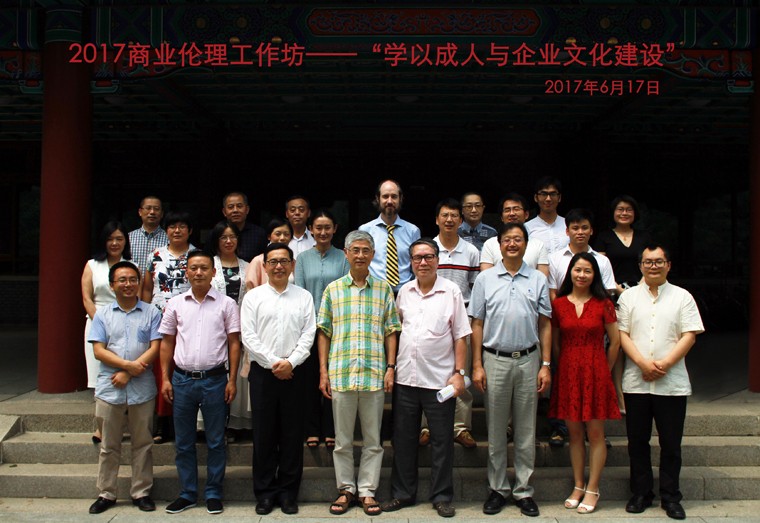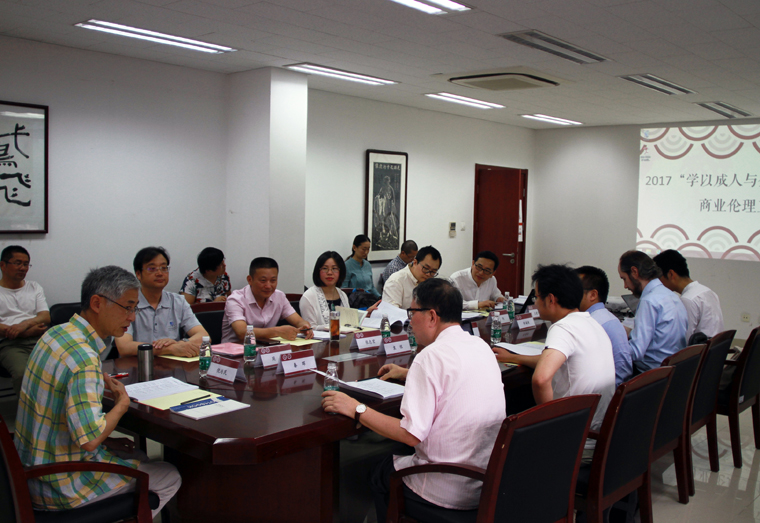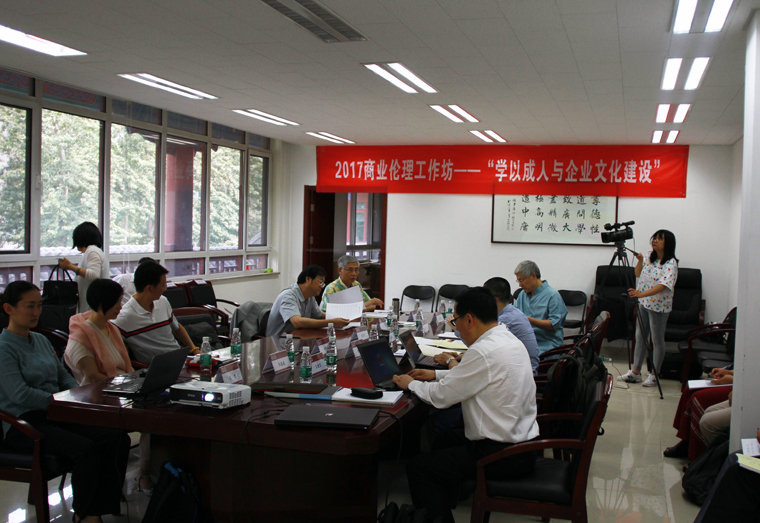



Host by the World Ethics Institute Beijing (WEIB) at Peking University and co-organized by Cheung Kong Graduate School of Business (CKGSB) and Sinyi Center for Culture Studies of the Institute for Advanced Humanistic Studies, a business ethics workshop Learning to be Human and Corporate Culture Construction was held in Conference Room 203, Building 4 of Lee Shau-kee Humanities at Peking University on June 17, 2017. On behalf of Prof. Tu Weiming (Director of the Institute for Advanced Humanistic Studies, IAHS), Prof. Ni Peimin, Executive Vice-director of IAHS, delivered the opening remarks to welcome all the scholars, representatives and other participants. This is the third thought feast of Confucianism and business on Peking University campus, following the past two in 2015 and 2016.
The first session was under the theme of Traditions of Moral Philosophy and Learning to be Human. Prof. Qin Hui from the Department of History at Tsinghua University hosted the first session and made some remarks on the relationship between the “public and private” in the traditional Chinese society, and on Yanfu's translation of On liberty written by John S. Mill. Dr. Jiang Xiaojun from the Civil Aviation University of China discussed the great transformation of the traditional way of understanding politics under the impact of Western thought from the perspectives of political legitimacy of modern Chinese political philosophy and the theory of evolution. Dr. Misha Tadd, a postdoctoral researcher at the IAHS, presented his paper Virtue Ethics without Virtue on Daoist ideas of He Shanggong in the Han Dynasty. Under the title "From heroic character to interdependence: on the ethics of human vulnerability and dependence," Assoc. Prof. Dr. Yuan Cheng of the Capital Normal University pointed out that the modern business community encouraged the mentality of "successful strategist" but ignored the fundamental vulnerability of human beings and their deep dependence on groups and others. Doctoral Candidate Wang Kaige at IAHS discussed the order of market exchange and moral philosophy constructed by Adam Smith based on the psychological mechanism of "sympathy" with the paper Sympathy and Impartial Spectator: Adam Smith's Moral Philosophy.
The second session was on The Identity and Value Recognition of Confucian Entrepreneurs, presided by Mr. Zhou Li, Assistant Dean of CKGSB and the editor CKGSB Knowledge magazine. He briefly introduced the development of humanistic courses in CKGSB and pointed out that Chinese, Japanese and South Korean entrepreneurs may have value identification on "Confucian entrepreneurs" but lack the identity recognition. Dr. Ming Xu, lecturer of Zhejiang University of Media and Communications, discussed the construction of "Confucian entrepreneurs" discourse system, the value of identity and Confucian entrepreneurs' views on the organic system, from three perspectives: what it means to be a Confucian entrepreneur, what the core values of Confucian business are, and what Confucian business should study and what significant challenges it fases. Assoc. Prof. Zhu Lu from the Shanghai University of Finance and Economics shared her experience in establishing Confucian business ethics courses at her university and her idea of setting up a CMBA (Confucian Master of Business Administration) program to introduce the essence of ancient Chinese business ethics to the West. Mr. Zhang Zhihong, Board Chairman of Nanchang Tongchuang Real Estate Development Co.Ltd, pointed out that any business person could be recognized as a Confucian entrepreneur as long as the person adhere to the Confucian value of sincerity (诚) and Ren Yi (仁义). Dr. Wang Jianbao, Director of the Center for Humanities and Business Ethics of CKGSB, discussed that Confucian entrepreneurs are people who embody the characteristics of Confucian spirit and business talent, and pointed out the source of traditional anti-business thought originated from legalist thought and the accomplice is the imperial power and government monopoly.
The third session on The Implications of Corporate Culture and its Construction was hosted by Prof. Ni Peimin, Executive Vice-director of IAHS. Dr. Wang Kun, post-doctoral at IAHS, discussed the theoretical basis of Zhu Xi 's view on the relationship between the “public and private” under the perspective of language conversion from meta-language to object language. Assoc. Prof. Wen Xianqing from Hunan Normal University discussed the significance of Confucianism to the construction of corporate social responsibility, and introduced the "ability methodology" of Amartya Sen and Martha Nussbaum. Assoc. Prof. Tu Mingjun from Renmin University of China, shared GE (General Electric) business ethics and business practice, pointing out that their core spirit was integrity, which meant the consistency between intention, words, action, and assessment. Assoc. Prof. Zhang Weiwei from Wang Jian School of Law, Suzhou University, discussed the different paradigms of Weber and Marx's understanding of economy, law and religion.
Prof. Yao Zhongqiu, Beijing University of Aeronautics and Astronautics, presided over the last session on The Humanistic Interpretation of the “Belt and Road” Initiative and Corporate Culture. Assoc. Prof. Zhu Huiling from the Department of Philosophy at Capital Normal University and Dr. Jia Peitao, post-doctoral of the Department of History at Tsinghua University reflected on the construction of Confucian business ethics and issues on how to build the value of commercial subject in the era of globalization and in the context of global justice. Dr. Peng Rui from the Department of Philosophy at Peking University believed that the function of religious ethics was to reduce transaction cost for business cooperation and economic activities, which responded to the problem posed by Prof. Qin Hui who recognized the bunisness ethics is to make trade more sucesseful.
After a heated discussion, Dr. Wang Jianbao made a brief summary of the whole day workshop that it is better for us to study Confucian business ethics and establish the identity of Confucian entrepreneurs with an attitude of enlightenment-reflection in the context of cultural China, under the perspective of civilization dialogue.

Copyright@2014北京大学高等人文研究院 京ICP备案1253235 地址:北京市海淀区颐和园路五号北京大学李兆基人文学苑4号楼 技术支持:iWing